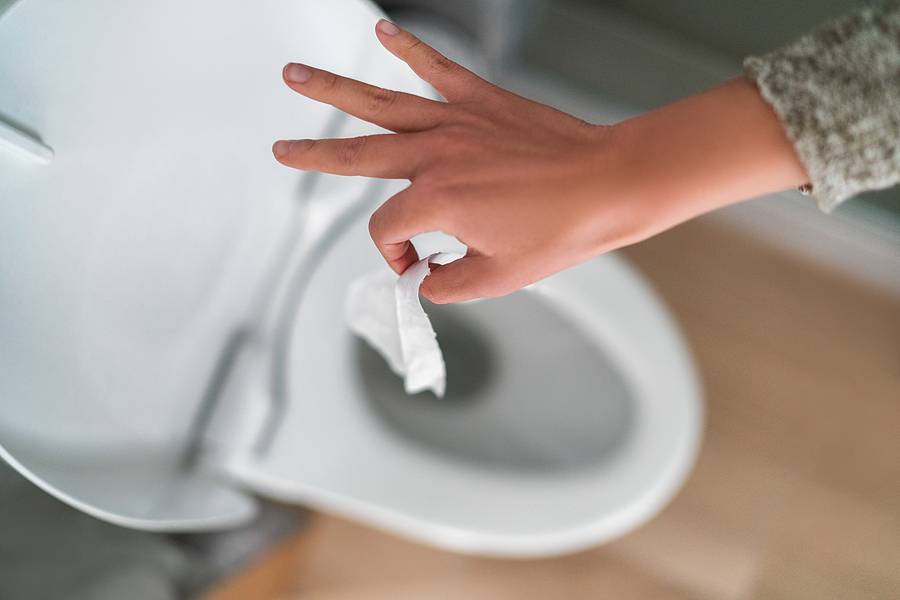
05
Many homeowners unknowingly engage in habits that can harm their septic systems. In this article, we will explore five common habits that can damage your septic system and provide insights on how to avoid these pitfalls with services offered by Charlotte Septic Pros.
One of the most damaging habits for a septic system is flushing non-biodegradable items down the toilet. Items like paper towels, feminine hygiene products, and wet wipes do not break down easily and can lead to clogs in the septic system. These blockages hinder the flow of wastewater, causing backups and potentially contaminating the groundwater.
To prevent such damage, it's crucial to educate everyone in the household about the proper disposal of waste. Trash cans in bathrooms serve as a friendly reminder to avoid flushing non-biodegradable items, protecting the septic system's longevity.
Using harsh chemicals in household cleaning can be detrimental to the septic system. Chemical-based drain cleaners and antibacterial soaps can disrupt the natural balance of beneficial bacteria within the septic tank. These bacteria play a crucial role in breaking down organic waste, and their destruction can hinder the decomposition process. It may even damage the tank to the point where you’ll need a new septic tank installation.
Choosing septic-safe cleaning products and avoiding excessive use of chemicals helps maintain a healthy bacterial environment within the tank. Additionally, regular septic tank pumping ensures that any imbalance caused by occasional chemical use is promptly corrected.
Excessive water usage is a significant factor in septic system damage. Engaging in habits like running multiple water-intensive appliances simultaneously, such as the dishwasher and washing machine, can overwhelm the septic system. The resulting high water flow can prevent the proper settling of solid waste in the tank and lead to untreated effluent being discharged into the drain field.
Conserving water by fixing leaks promptly, using water-efficient fixtures, and spreading out water-intensive tasks throughout the day can help alleviate stress on the septic system. Regular inspections and septic tank repairs by a professional septic company can ensure that the system is coping well with water usage.
The drain field is a critical part of the septic system responsible for the final treatment and disposal of effluent. Parking vehicles or planting trees and shrubs over the drain field can lead to serious damage. Heavy vehicles can compact the soil, hindering proper water absorption, while the roots of plants can infiltrate and clog the drain pipes.
Homeowners should be aware of the location of their drain field and refrain from parking or planting over it. Ensuring that the area is used for low-impact purposes will help preserve the drain field's integrity and prevent costly septic tank repair in the future.
Ignoring warning signs of septic system problems is a habit that can lead to extensive damage. Signs like slow-draining sinks, gurgling toilets, foul odors, or wet patches around the drain field should never be overlooked. Ignoring these indications could allow the issue to worsen, leading to costly repairs or even complete system failure. If the system fails, you’ll need a new septic tank installation, which is a costly service you don’t want to deal with.
Instead, homeowners should act promptly and seek professional assistance from a reputable septic company. Regular septic tank pumping and inspections can also help detect minor issues early on and prevent major septic system damage.
By being aware of these common habits that can damage a septic system, homeowners can take proactive steps to protect their investments. Responsible waste disposal, limited use of harsh chemicals, water conservation, proper drain field maintenance, and swift action when warning signs arise are essential practices. Regular maintenance and expert services from septic companies play a pivotal role in ensuring the longevity and efficiency of the septic system, safeguarding both the property and the environment.

22
Can Bacteria Additives Eliminate the Need for Pumping? If you own a home with a septic system, you’ve probably seen…
Read more
12
A single slow drain in your home can feel like a minor inconvenience. Maybe the sink takes a little longer…
Read more
05
Are Slow Drains a Septic Issue or Just a Clog? Slow drains are one of those household problems that start…
Read more
02
What Septic Service Techs See That Homeowners Miss Most homeowners only think about their septic system when something goes wrong.…
Read more
21
Simple Habits That Protect Your Septic System A well-functioning septic system does its job quietly, but the moment something goes…
Read more
14
Pump Now or Pay Later: The Real Cost of Skipping Maintenance A properly functioning septic system is easy to forget…
Read more
11
Why Your Septic System Always Acts Up at the Worst Time Homeowners often feel that septic problems strike at the…
Read more
04
Early Warning Signs Your Septic Tank Needs Pumping For homeowners who rely on a septic system, routine maintenance is not…
Read more
29
Why Does My Septic System Smell Fine One Day and Terrible the Next? If you own a home with a…
Read more
19
Is Your Septic System Overdue? Simple Home Checks You Can Do Today For many homeowners, the septic system is a…
Read more